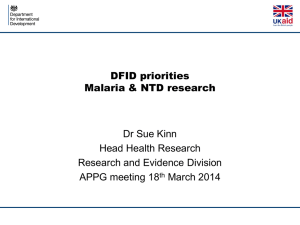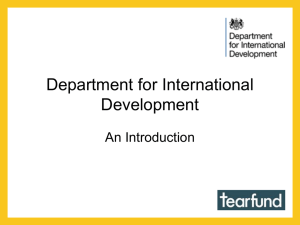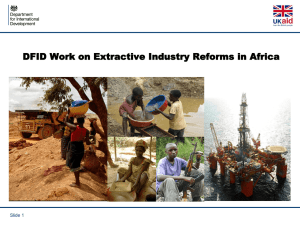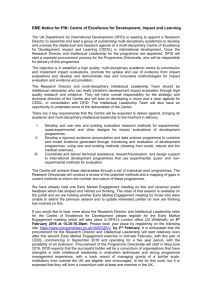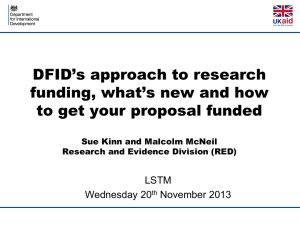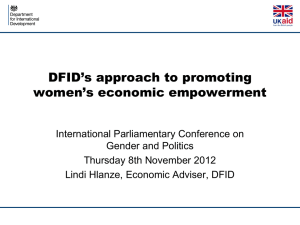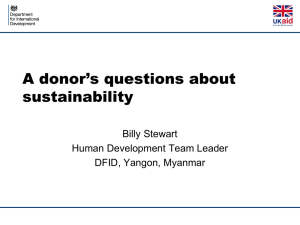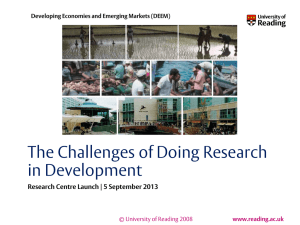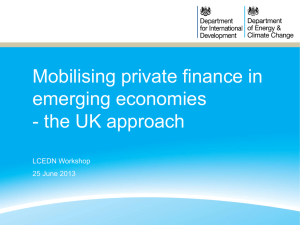The Civil Service is a large public sector employer with a
advertisement
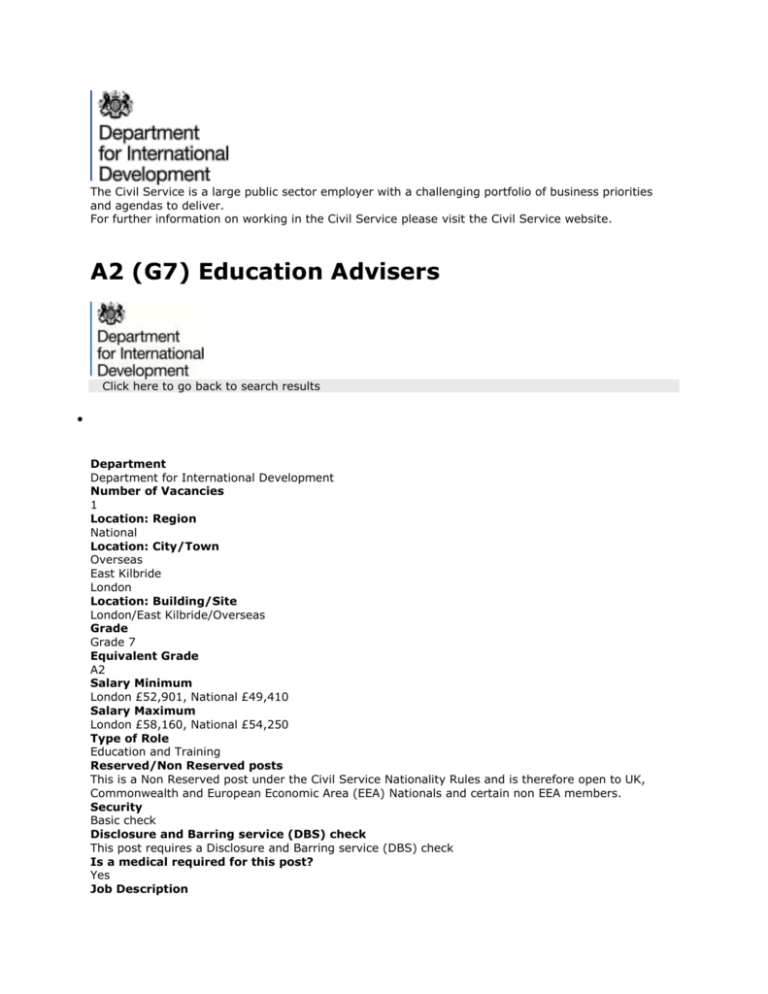
The Civil Service is a large public sector employer with a challenging portfolio of business priorities and agendas to deliver. For further information on working in the Civil Service please visit the Civil Service website. A2 (G7) Education Advisers Click here to go back to search results Department Department for International Development Number of Vacancies 1 Location: Region National Location: City/Town Overseas East Kilbride London Location: Building/Site London/East Kilbride/Overseas Grade Grade 7 Equivalent Grade A2 Salary Minimum London £52,901, National £49,410 Salary Maximum London £58,160, National £54,250 Type of Role Education and Training Reserved/Non Reserved posts This is a Non Reserved post under the Civil Service Nationality Rules and is therefore open to UK, Commonwealth and European Economic Area (EEA) Nationals and certain non EEA members. Security Basic check Disclosure and Barring service (DBS) check This post requires a Disclosure and Barring service (DBS) check Is a medical required for this post? Yes Job Description At DFID we consider that there is a very strong case for sustained investment in education. This is because education is fundamental to development. It is both a human right and an investment for global prosperity. Good education outcomes are development goals in themselves, because they directly improve people’s lives. Education enables people to live healthier, happier and more productive lives; a pathway to maximise individual potential, extend freedoms, build capabilities and open up opportunities. Households with more education are better able to cope with economic shocks and more able to take advantage of new opportunities. The benefits of education for girls and women are particularly strong. Educated women have fewer, healthier children, higher income, cope better with extreme weather events and are less likely to accept domestic violence and harmful cultural practices. Education is also a necessary ingredient for economic development and poverty reduction. Evidence on the link between the quantity of education and economic growth has been mixed. What appears to matter for growth is not time spent in school but whether students are learning. Education is part of a broader transformational agenda, which can be framed in terms of the building blocks of prosperity. Education is a multiplier that can promote better governance, more peace and democracy, political stability and the rule of law. Taken together, the emerging evidence suggests that a quality education can enable people to shape, strengthen and contribute to the building blocks of open economies and open societies. Thanks to more effective education policies and sustained national and international investment, many more children are in school across the developing world. Out of school children are down from 105 million in 1999 to 61 million in 2012. Yet the evidence is clear that many of those in school are learning very little. At least 250 million children cannot read or count, even if they have spent four years in school. DFID’s approach to education is focused on helping countries to improve learning, getting more children into school, and making sure girls stay in school. We work with a range of partners, including national government, civil society, the private sector and foundations. We engage with a variety of aid modalities from sector budget support to partner governments to projects with NGOs. Education advisers are key to ensuring that our programmes are well designed, properly implemented and robustly evaluated. Job Description/duties DFID Advisers are expected to play a major role in our key areas of education engagement. These include: - Education systems, planning and programme design - Education policy analysis - The global education architecture - Equity issues - Application of evidence, innovation and evaluation - Shared competencies (see below) Duties may include 1. Analysis and the formulation of policies and programmes for country aid strategy, working with other DFID advisers, programme managers, researchers and consultants. 2. Establishing close and constructive relationships with country partners (organizations and individuals) This will be dependent on the role but could include for example, with government at different levels, with the private sector, civil society, research organizations, and academics. 3. Establishing close and constructive relationships with key international players, Foundations and bilateral and multilateral aid agencies ¡V in-country, at headquarters, regionally or internationally ¡V where necessary. 4. Working effectively with other Whitehall departments on a broad range of professional/specialist related issues relevant to the specialism and developing countries. 5. Identification, design, commissioning and monitoring the implementation and impact of projects, programmes and policies in areas covered by DFID’s professional advisers on agendas such as wealth creation, pro-poor growth, hunger, climate change etc. 6. Design and monitoring the impact of DFID projects, programmes and policies in all areas for development such as governance and conflict, health, education and infrastructure and climate change. 7. Develop an excellent understanding of the evidence, ideas and issues around how best to improve educational outcomes in low resource setting, including the cost-effectiveness of interventions designed to improve access, quality and outcomes of education programmes Personal Qualities and Skills Required (Person Specification) Civil Service Competency Framework 2012-17 – Level 4 Seeing the big picture Making effective decisions Collaborating and partnering Delivering at pace Delivering VfM Leading and communicating Technical competencies and professional skills Technical Competencies – Education, see below : What is the minimum level of qualification required Post Graduate Degree or Equivalent in a relevant social science discipline (usually in the field of education and international education) Technical Competencies - Education Advisers Summary: Education advisers are required to have a relevant post graduate degree usually in the education and international development field, plus experience of education in a developing country context. They must demonstrate knowledge and understanding of: Education systems, sector planning and programme design Education policy analysis The global education context including international education architecture and international engagement; Equity issues and pro poor education interventions Evidence, innovation and evaluation in education Advisers are also expected to demonstrate knowledge and understanding of four shared technical competencies: • International aid • Collating, analysing and presenting evidence/research using statistical and wider analytical skills • Economic concepts and appraisal • Evaluation Each competence will be assessed on the following scale: 1= needs significant development; 2 = needs some development; 3 = acceptable; 4 = good; 5 = excellent. A1 advisers are generally required to have 4s and 5s across all competencies. 1. Education systems, sector planning and programme design Knowledge/understanding of: The determinants of student access, participation, and learning inside and outside the education system Pedagogy that addresses learning needs at different stages of a child’s development The range of modalities for delivering education (public, private for profit, CSOs, open and distance learning) The linkages between different sub sectors (e.g. early childhood approaches, primary, secondary, tertiary, skills training, special needs) Cost effectiveness and efficiency issues in the education sector Full range of aid instruments Strengths and weaknesses of different models for sustainable education financing Governance, stewardship, and anti-corruption in the education sector Enabling Advisers to: Design, lead and contribute to evidence-based appraisals of education systems and institutions Design DFID’s education portfolio and choice of projects and delivery channels, aid modalities as part of business case planning and meeting results Contribute to annual reviews, fiduciary risk assessments and other evaluations to assess DFID’s support to partner countries Provide evidence and guidance to colleagues in DFID and externally on education related aspects of development assistance Monitor the budget and expenditure and identify impact on education outcomes and poverty reduction. Identify fiduciary risk and ensure thorough tracking of resources allocated to programmes 2. Education policy analysis Knowledge/understanding of: Priorities and constraints in education systems in low resource environments and trade-offs of different policy options Range of tools for monitoring and evaluation of education systems (e.g. classroom assessment, large scale assessment, examinations, impact evaluation, routine management information) and their roles in measuring progress Data limitations and how to address them, including building EMIS capacity Impact of public sector reforms, including financing, decentralisation, human resource management and constraints Finance for development in education; including domestic sources, results based financing; demand side financing Enabling advisers to: Engage in policy consultations, taking into account the social and political dimensions of the policy process Design programmes that measure and monitor learning outcomes and systems effectiveness, including strengthening data systems Monitor progress on student access, survival rates, and learning outcomes Identify key factors affecting recruitment, deployment, retention and management of education personnel Develop a clear understanding of education financing framework and the impact of different inputs e.g. domestic, external including results-based, demand-side financing 3. Global education context including the international education architecture and international influencing Knowledge/understanding of: Structure, policy and approach of key multilaterals and global funds (WB, UN, EC, GPE ) major bilateral development agencies, Foundations, academic institutions, private entities, civil society. Principles of and tools to measure value for money in education related investments Working with other UK government departments on global education: DfES, FCO, UKTI, BIS, MoD Networks, thought leaders, academics and policy makers, especially in the Global South The role of the media in shaping and structuring DFID’s work to different audiences Enabling Advisers to Understand how major players work and identify opportunities to work effectively with them internationally and in countries To engage in national and international dialogue on key education issues, identify and work to DFID’s comparative advantage. Forge strategic partnerships and strengthen DFID’s ability to provide expertise and evidence to partner countries and international organisations Apply cutting edge knowledge and communication approaches to disseminate key messages and results to influence global dialogue on education 4. Equity issues and application of pro poor education interventions Knowledge/understanding of: The range of demand and supply factors that impact on learning and cause children to be excluded from education Targeted interventions to reach the poor and excluded Pedagogical approaches that maximise the impact on poor and marginalised groups Accountability mechanisms that can support the excluded to attend, stay in and learn in school Evidence for the role that community participation can play in reaching the poor and excluded Enabling advisers to: Analyse social and political dimensions of policy processes Advise and propose solutions to strengthen pro-poor and equitable policy, implementation and budget processes Develop practical proposals for engaging communities in planning, monitoring and accountability processes Advise and support civil society coalitions for pro-poor policy change Support multi-sectoral and non-education sector approaches to improve education outcomes for all. 5. Application of evidence, innovation and evaluation Knowledge/understanding of: Key quantitative and qualitative research methodologies in education Global education research priorities and modalities (role of GPE, the World Bank and other key actors.) Key sources of published research, systematic reviews and other evidence on education issues How to access and critically appraise research and assess the quality of available evidence in comparative and international education Designing rigorous evaluations of country programmes making use of research in policy and practice Tools to build capacity of researchers and institutions Enabling advisers to: Stay professionally up-to-date Critically appraise new evidence and understand its relevance and robustness Incorporate evidence from evaluation and research into ongoing programme and policy activity and build research and impact evaluation into programme design and policy development Contribute effectively to the development of DFID education policy and strategies Develop effective monitoring and evaluation frameworks Use evidence to develop creative responses to complex education problems Develop networks of contacts and sources of information for knowledge management Develop and build capacity for research SHARED TECHNICAL COMPETENCIES (REQUIRED) There are four areas of knowledge and skills that are common to all advisory groups. These are intended to add value to DFID’s professional advisory skill base and the ability of advisers to meet business needs. Knowledge and understanding of international aid Familiar with: • The Millennium Development Goals (MDGs), post-MDG discussions and international architecture for aid and development the UN, European Union, G8, G20, International Finance Institutions, regional institutions and NGOs • Aid instruments and how they are deployed – project financing, sector-wide approaches, budget support, technical assistance, results based aid, and global funds • The changing aid landscape and the role of new players and financial flows outside ODA – e.g. emerging economies, BRICS, private foundations, business and think tanks • The UK international policy framework and its implications for international development – e.g. trade, security, fragility and climate change Collating, analysing and presenting evidence/research using statistical and wider analytical skills • Able to access, critically appraise and use evidence, including understanding of a range of qualitative and quantitative research methodologies including the application of basic statistical methods • Able to carefully and systematically examine research to judge its trustworthiness and its value and relevance in a particular context and other potential sources of evidence • Able to interpret, use and present data and evidence in defining policy and practice • Comprehend and use key concepts from social, political economy and environmental analysis. • Good level of general numeracy Economic concepts, appraisal and value for money • Familiar with key economic concepts including: the importance of incentives; scarcity and choice; markets and market failure; public policy and government failure. • Understand economic approaches to project appraisal and evaluation, including different ways of measuring economy, efficiency and effectiveness. Evaluation and results • Competent (level II or above in DFID’s evaluation competencies) in applying best practice in evaluation design, using a range of rigorous methods, and ensuring high standards of independence and quality • Able to design, commission and manage evaluations including rigorous impact evaluations, with appropriate technical support, in line with DFID standards Competence 1 Seeing the Big Picture Competence 2 Making Effective Decisions Competence 3 Collaborating and Partnering Competence 4 Delivering at Pace Competence 5 Delivering Value for Money Competence 6 Leading and Communicating Qualification(s) Post Graduate Degree or Equivalent in a relevant social science discipline (usually in the field of education and international education) Working Pattern This job/these jobs are available for full time or part time staff only Employment Terms: Post Type Permanent Employment Terms: Hours 36 Interview location and dates Assessment Centres will be w/c 11 November 2013. Further details are in the Specific Vacancy Information. Contact and further details Please contact: CHOPUnitQueries@dfid.gov.uk with any questions or queries about this vacancy. Please note that there are 2 application forms to complete for this post: the standard online application form as well as the technical competency application form which is attached below along with the technical competency framework. You need to upload the technical assessment application form in the ‘additional attachment’ section of the online application form. • Once you have submitted your application it cannot be amended, only submit your application when you have completely finished and answered all the relevant questions. • Please ensure you attach an up to date CV to your application. • Please ensure you attach the technical competences application form to your application (for technical posts only) • Late Applications will not be accepted. All applications for these vacancies must be made on-line. There are limited exceptions to this. Paper applications will only be considered if you have a disability that will prevent you from applying on-line. If this is the case, please email CivilServiceJobs@dfid.gov.uk Details of the Civil Service Nationality Rules are located at: http://www.civilservice.gov.uk/about/resources/nationality-rules Candidates will be subject to UK immigration requirements. For the most up-to-date information on the requirements of working in the UK, please go to the UK Border Agency website: http://www.ukba.homeoffice.gov.uk/visasimmigration/working/ The Civil Service is committed to providing services which embrace diversity and which promote equality of opportunity. We also offer a guaranteed interview scheme for disabled applicants who meet our minimum selection criteria. We will not tolerate discrimination on any of the following: gender, marital status, sexual orientation, race, colour, nationality, religion, age, disability, HIV positivity, working pattern, caring responsibilities, trade union activity or political beliefs - or any other grounds. Pension Statement Pension schemes are available and more information will be provided to successful candidates. For further information on these schemes please refer to the following website www.civilservice.gov.uk/pensions The Cabinet Office’s recruitment processes are underpinned by the principle of selection for appointment on merit on the basis of fair and open competition as outlined in the Civil Service Commission’s Recruitment Principles. http://civilservicecommission.independent.gov.uk/news/recruitment-principles/ lf your application has not been treated in accordance with the Recruitment Principles and you wish to make a complaint, you should contact the recruiting department in the first instance https://jobs.civilservice.gov.uk/help/faq.cgi If you are not satisfied with the response you receive you can contact the Civil Service Commission. http://civilservicecommission.independent.gov.uk Closing date 19 Sep 2013 CIVIL SERVICE COMPETENCY FRAMEWORK 2012-2017 EDUCATION TECHNICAL COMPETENCY FRAMEWORK INCLUDING SHARED COMPETENCIES A2/G7 EDUCATION SPECIFIC VACANCY INFORMATION Technical application form
